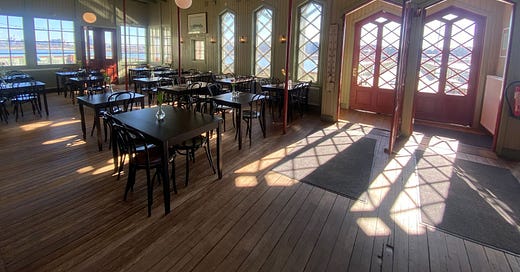Dear Friend,
I hope you’re doing well.
I’ve just returned from a weekend visiting my dear friend Franny, a Brit living in Sweden, along with another wonderful London pal, Rosie. Rosie and I spent a few hours in Copenhagen before jumping on a train across the Öresund to Malmö, the port town that Franny has made home over the last few years.
I’ve been to visit once before, so I knew a little what to expect, but I was still struck by how different Swedish culture is from French culture. In Paris in particular there is always a kind of taut, alert, sometimes chaotic energy in the air and I always have the feeling that anything could happen at any time. In the last few months I have seen the following sights pass without any great remark: A bin on fire by the Louvre, a street fight involving one man waving a ladder, street signs turned upside-down (I believe the work of protesting farmers). Even everyday scenes have a touch of the extreme about them, like the giant cherry-picker trucks that people hire to bring their furniture down from narrow top-floor apartments, or the cacophony of shouting at any given food market.
In Paris, there is also a sense that the line between the self and others is thin and that quite often strangers will feel at liberty to comment on whatever you happen to be doing – in particular if you are a woman. If you ever happen to eat on the go (something that is not really done in French culture), you can expect some smug stranger to comment “on a faim, hein !” (someone’s hungry eh!) or even “on est gourmand !” (someone likes their food!). Recently I was looking for a place to park my Vélib city bike rental near Opéra in the centre of town. I was wheeling the bike next to me and a passing man commented “vous êtes en train de nous ECRASER tous avec votre vélo !” (“you are CRUSHING us all with your bike!”). Five minutes later, I was still looking for a parking spot when I came across the same man again. “Oh la la!”, he said when he saw me: “la fainéante (lazy woman) again! Still can’t be bothered to get on your bike!”. This kind of highly intrusive comment is so common here that I just carried on about my business.
To put it mildly, Swedish culture is not this way. Overall, the people come across as calm, self-contained, reserved and thoughtful. Traffic lights are respected, personal space is observed, the streets are almost eerily clean (or have I just been in Paris too long?). Throughout the weekend, Rosie and I kept using the word “civilised” to describe what we saw, from the little lines of schoolchildren dressed in adorable and practical snowsuits to the quiet order and understated stylishness of the municipal library.
Franny taught us about the principle of Jantelagen or the Law of Jante, which characterises the egalitarian culture of Scandinavian countries. The phrase itself comes from a satirical novel in the 1930s set in a fictional Danish town called Jante, where everyone knows everyone’s business and nobody must stand out. Since then, it’s become more synonymous across Scandanavian countries with norms like a certain tasteful conformity when it comes to how people dress, how they decorate their homes, which cars they drive — and an emphasis on blending in and not showing off.
There is, as I understand it, a sense that the communal need is more important than the individual desire, and that harmony is achieved through sharing and unemotional cooperation. For example, many buildings have a shared laundry room (tvättstuga), which is governed by a roster. Each household must book their slot ahead and they must stay within its bounds: using the facilities during someone else’s slot or leaving things in the room after you’re done is seen as deeply rude. Most people have a set time each week that they don’t miss, it’s even quite common for people to take some hours off work in order to use their tvättstuga time . In turn, employers are unlikely to refuse because it’s understood that one’s life and personal obligations are important and that productivity should be mixed with wellbeing. Very civilised!
During our visit, we spent one afternoon at the Ribersborgs Kallbadhus bathhouses, known to locals as Kallis (translating to something like ‘coldy’). It’s a beautiful wooden structure located at the end of a jetty on the Öresund, with a view out to Copenhagen on a clear day. The site was built in the late 1800s and comprises a large light-bathed café serving prawn sandwiches and chokladbollar (chocolate cake balls), then separate men and women’s saunas and bathing areas, as well as a mixed sauna between the two.
This is the second time I’ve been there now. On my first visit, I was surprised to learn then that nakedness is obligatory for the sauna and sea-bathing deck. Well, you can stay wrapped in your towel, but swimsuits are not allowed for hygiene reasons, and most everyone opts to be nude. You can choose between a silent sauna, where people sit and reflect or read, or a chatty sauna — both have a a floor-to-ceiling view of the sea. After getting hot, the idea is to then head out onto the deck and plunge into the cold sea (3 degrees on our visit). I managed getting about knee-deep, but the locals are pretty gung-ho.
The nakedness there, like everything else we observed, is civilised. In fact, in the women’s section at least, it felt more than civilised – it feels gentle, enclosing, quietly life-affirming. There is every type of body – smaller, bigger, people who have had a mastectomy, tattooed women, young, old. Out on the deck naked bathers took turns to use a bubbling-warm hot tub, while some women had thrown a coat over themselves and were reading in the wintry sun, or tending to young children – some were just (cold) sunbathing like serene cats. The relaxed nakedness is in some ways a contrast to the general feeling of self-restraint, and yet perhaps made possible by it, creating a kind of separate togetherness.
According to my friend, the regular ritual of going to the ‘Kallis’ is illustrative of the emphasis on quality of life in Swedish society. French society also values quality of life highly, though it seems to be defined differently. To generalise hugely, for the French quality of life might be characterised by pleasure in food, wine, love, beauty and sunshine while for the Swedes it seems to be more about relaxation, balance, intentionality and good taste. In fact, how each nation defines the good life can be understood in how each makes fun of the British. The French mock us for our (perceived) bad food and (actual) bad weather, where – according to my friend – the Swedes mock the British for our terrible taste in home décor! One Swedish friend said to Franny: “I was once in a British home and there was CARPET in the bathroom! I nearly vomited.” Apparently one of the subtle ways in which it is permissible to show off wealth in Sweden is through one’s upscale homewares, such as an exquisite designer salt and pepper shaker!
The Swedish state is expected to play its part in facilitating equality of opportunity through provisions such as long parental leave, unemployment pay and ongoing free education opportunities throughout life. This approach to life also comes with an emphasis on restraint and moderation. I was tickled to learn about the practice of Lördagsgodis, meaning ‘Candy Saturday’ or ‘Saturday Sweeties’ – essentially a designated day of the week when Swedish children are allowed to eat sweeties. Apparently adults also tend to wait until Saturday to eat their goodies, and young and old can be seen carefully picking a selection at the supermarket pick-and-mix counter.
While Swedes generally seem to embrace a quite healthy, outdoorsy lifestyle, I was also struck by the prevalence of snus, consumed in little sachets that are stuck inelegantly to the gum behind the upper lip. Traditionally the pouches contain dried tobacco (like snuff), that kind is banned in all EU countries but Sweden. These days flavoured nicotine-only variants are popular among the younger generations. In any given bar and in some workplaces you’ll see people poking a little snus bag up into their gums, or prising it out once it’s done. Apparently regular users develop a little dip in their gum where their snus packet sits. I can’t help but think it would never catch on in France because the process of putting it in and out is much too ugly (better to stick with sexier toxin-ingestion methods, like good old-fashioned smoking).
What do you think? Are you Swedish or do you know Swedish culture well? Do these characteristics feel accurate? Is the culture changing? Please write back and let me know!
Thirty-second book club
I recently recorded an interview for
(I will share it here when it’s released!) and their founder Lou kindly gifted me a book of my choice. Based on a recommendation from my friend Fiona — a woman of fine taste — I opted for Yellowface, a satirical 2023 novel by R. F. Kuang. It’s an examination of the publishing industry, being online and hypocrisy. It’s also a clever and unconventional thriller that kept me up ‘til the wee hours reading to the conclusion. Fiona’s taste did not let me down!Thank you for reading this week’s letter! I hope you enjoyed it. Please do ‘like’ and share the post if you did, and consider subscribing if you don’t already.
Thank you also to Lynn-Marie in California who recently became a sponsor of the letter. Your hand-painted card is on its way!
If you can and feel inclined to, please do consider sponsoring Pen Friend.
I’ll write soon! Have a good week.
Yours,
Hannah









Hej from Lund, just fifteen minutes from Malmö, coming for my Paris content and getting a surprise :) Much is true, but I am absolutely fascinated by the outside view of Sweden and Scandinavia as endlessly rational and civilised. I think that Sweden, like all European countries, has aspects that make you think, "Ah! This is the way to live!" and aspects that make you think, "WTF?" (I recommend looking up an NYT piece on what happened to #MeToo in Sweden or what happened during the pandemic in old people's homes). There is a downside to Jante, I've been told, where exceptions get squished, and it is also very hard for outsiders to get jobs here. It takes six months for Swedes to get a new job and eighteen months for outsiders. Not sure on the stats for Swedes with "foreign" names, but there have been some infamous experiments with sending out the same CV with different names etc. It's also a small country in terms of population (yet geographically the size of California) and a small language, so to speak (I love Swedish and am learning it this year). And speaking of WTF, the candy day was the result of a series of notoriously inethical twentieth-century experiments that took place in Vipeholm, a district of Lund. Sweets (and extra sticky ones) were fed to psychiatric patients and the resulting decay measured... So, I do like it here, and I am happy to be here, but I try to see the whole picture.
Ah, that was a great read. Sweden sounds a tad claustrophobic for my tastes but I'd still like to check the place out. There are quite a few Swedish medical students here in Bydgoszcz, and they are wild! I think it's similar to the Amish Rumspringa!